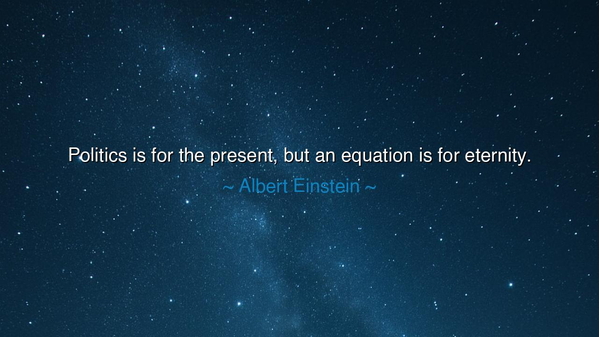
Politics is for the present, but an equation is for eternity.






Hear, O seekers of eternal wisdom, the profound words of Albert Einstein: “Politics is for the present, but an equation is for eternity.” In this utterance, the sage of science draws a boundary between the fleeting affairs of men and the enduring truths of the cosmos. For politics, with its quarrels and shifting powers, belongs to the dust and the moment, but equations, carved from the logic of the universe, endure beyond kingdoms, beyond empires, beyond time itself.
For politics is like the tide, ever rising and falling, driven by the winds of ambition, fear, and rivalry. What seems mighty today may be forgotten tomorrow; the decrees of kings turn to ash, the speeches of leaders fade with the air. Yet an equation, once revealed, shines like a star that never dies. It belongs not to one people or one age, but to all humanity and all generations.
History itself proves this truth. The decrees of Pharaohs are forgotten, yet the Pythagorean theorem, born of Greece, still instructs students thousands of years later. The empires of Babylon have fallen, but the laws of geometry they touched remain eternal. So too did Einstein himself, when he gave the world E = mc², forge not a policy of a decade but a truth that reshaped the destiny of humankind, binding energy and matter together in eternal law.
Yet his words are not scorn for politics, but perspective. Politics governs the hour, and in the hour it is needed—for people must be fed, justice must be sought, peace must be kept. But he warns us not to mistake the temporary for the eternal, nor to believe that the shouting of assemblies is equal to the still, clear voice of truth discovered through reason. Equations endure because they speak not of men’s desires, but of the universe as it is.
Therefore, O children of wisdom, let this teaching endure: politics may shape the present, but knowledge shapes eternity. The wise will labor not only in the struggles of their own time, but also in the pursuit of truths that will outlast empires. For leaders are forgotten, but ideas remain; power crumbles, but knowledge builds forever. Thus Einstein speaks, and thus we must remember: to serve the present is good, but to discover the eternal is divine.






TNThuy Nguyen
This quote speaks to the enduring nature of scientific principles compared to the ever-changing nature of politics. But is it realistic to treat politics as purely a product of the present? If it is, does that limit its ability to create lasting change? Could a more timeless approach to political thinking, grounded in broader, long-term objectives, make a real difference, or should political strategies remain adaptable and focused on immediate concerns?
TThy
Einstein’s quote highlights the difference between the immediate nature of politics and the eternal truths in science. But can politics ever truly be timeless, or is it inherently bound to its moment? If political decisions are so focused on the present, how can we ensure that they contribute to long-term progress? Does politics need a foundation of more eternal principles to guide it, or should it remain adaptable to each era’s needs?
TTNguyen Ha Thanh Thanh
I find Einstein’s perspective intriguing, especially when considering how quickly political landscapes change. Politics is often reactive, dealing with present issues, while equations are timeless, providing a constant foundation. But can we use the certainty of equations to guide political decisions, or is there a risk in thinking that political problems can be solved in such an exact way? What’s the balance between the two—flexibility and stability?
VTtran van tien
Einstein’s quote draws a powerful distinction between the transient nature of politics and the timeless quality of mathematics. Politics often feels like it is in a constant state of flux, driven by current events and immediate concerns. But math and equations, once proven, remain constant. Does this mean that we should focus more on enduring principles, or should we also be flexible and responsive in politics to address the ever-changing world around us?